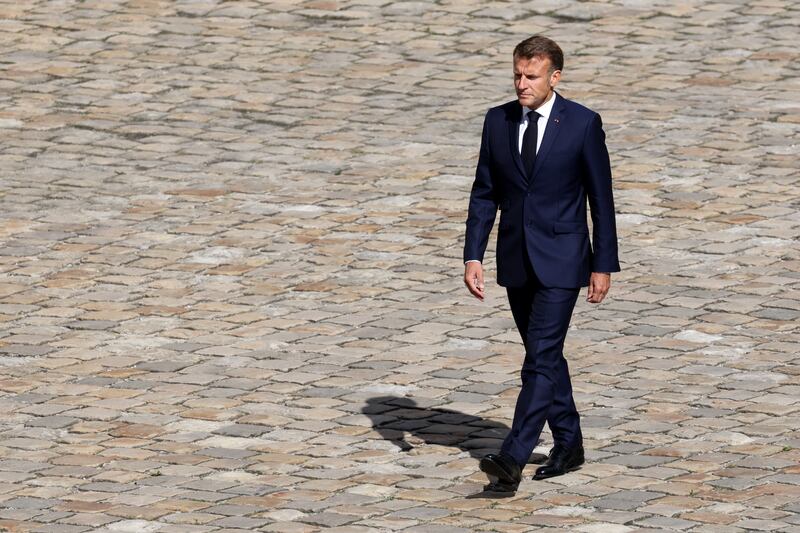French prime minister François Bayrou is expected to be toppled on Monday in a confidence vote over his deficit-cutting efforts, which would deepen political turmoil and put pressure on president Emmanuel Macron to find a way to break the parliamentary gridlock.
At the helm of a fragile minority Government, Mr Bayrou unexpectedly called for the vote before presenting his official 2026 budget proposal to parliament for debate, sparking incomprehension and anger among opposition politicians who then vowed to oust him.
The veteran centrist and long-time ally of Macron justified the move as necessary to forge a political consensus over his diagnosis that the national debt was a grave problem requiring an urgent response.
He said negotiations over specific items in his €44bn fiscal package should only begin in earnest after the confidence vote, an approach the opposition said was unworkable.
“What’s happening in our country [regarding national debt] is so important, so dangerous, so inevitable if nothing is done, that a jolt was needed,” Bayrou told France 5 TV on Saturday of his decision to call the vote.
 France’s president Emmanuel Macron Macron faces a narrowing set of options to chart a way out of the crisis. Photograph: Ludovic Marn/AFP via Getty Images
France’s president Emmanuel Macron Macron faces a narrowing set of options to chart a way out of the crisis. Photograph: Ludovic Marn/AFP via Getty Images
Many lawmakers across the left and on the far-right detested Bayrou’s ideas, especially his plan to get rid of two public holidays and raise tax on some pensioners. He also proposed a general freeze in Government spending, excluding defence.
If Bayrou is ousted, Macron will have to look for his fifth prime minister in two years, an unprecedented level of churn since the Fifth Republic was created in 1958 to ensure stability by giving more power to the executive.
Macron faces a narrowing set of options to chart a way out of the crisis. He is expected to try to find a new French Government leader, who can hopefully survive opposition attacks long enough to pass a budget plan by a year-end deadline.
Another option would be to again call early elections – a risky gamble given his own deep unpopularity and the polling strength of the far right led by Marine Le Pen.
The parliament has been fractured with no majority since Macron called and lost early legislative elections in June 2024. His centrist group was diminished, the Rassemblement National won more seats, and a short-lived leftist alliance elected the most lawmakers.
“It’s hard to see any configuration that can lead to a lasting Government,” said Mathieu Gallard, a pollster at Ipsos. “It’ll be hard for Macron to carry on like this. You’ll maybe have a Government that can last three weeks, three months, but it’s not sustainable. The only solution in the longer run would be to dissolve parliament.”
Key to any government’s survival and to get a budget passed will be the Socialist party, which with its 66 MPs has become a crucial bloc to swing a vote one way or another. Le Pen and the RN have hardened their stance lately, and are instead pushing for fresh parliamentary elections.
The president will try to thread the needle to find a prime minister who can garner at least a non-aggression pact with the centre-left Socialists, and he may try again with someone from his centrist grouping or the rightwing Les Républicains (LR) party, which are part of the current Government.
Socialist leader Olivier Faure has pitched himself as premier, but has vowed to choose only leftists as ministers and reverse many of Macron’s policies – conditions that make it unlikely Macron will choose him.
“You basically lose the Républicains (LR) if you get the Socialists on board,” said Franck Louvrier, an LR member and mayor of La Baule.
Macron has less than two years left until the next presidential election in 2027 but, without a majority in the National Assembly, his domestic policy agenda has stalled and his business-friendly reforms and tax cuts risk being rolled back.
Yearly budget planning has become perilous, causing conservative prime minister Michel Barnier’s downfall in December after only three months.
Pressure to address degraded public finances is growing after years of high spending on the Covid-19 pandemic and a subsequent energy crisis added to public debt. Investors have pushed up France’s 10-year bond yields to nearly the same as Italy’s, once a Eurozone laggard.
The Government aims to cut the deficit to 5.4 per cent of GDP in 2025 from 5.8 per cent in 2024, and to return within the 3 per cent EU of GDP limit by 2029.
Bayrou’s successor will have to water down the fiscal package, perhaps halving it to about €22bn as the Socialists have demanded. The left is also pushing for a new 2 per cent annual wealth tax on people whose assets are worth more than €100mn, which is a non-starter for Macron, centrist and rightwing MPs.
“Even the right-leaning faction within Macron’s party is very hostile to hitting the wealthy with more taxes,” Gallard at Ipsos said. “There are so many red lines drawn by one party and another, it’s hard to envisage alliances.”
– Copyright The Financial Times Limited 2025
